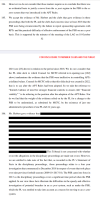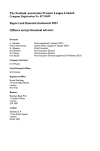1. Safer to assume the opponent are not idiots or irrational. It is really very unlikely. At UEFA one of the biggest issues is that City appear not to have fully engaged and therefore UEFA could argue they acted rationally based on what was before them. I don't think it is established that UEFA was irrational - certainly CAS never made such a statement.You're assuming that the PL is acting totally rationally though. UEFA's CFCB issued a harsh sanction against us based on a selective handful of emails they drew an (incorrect) inference from. But once an independent body was involved they were not able to present any cogent evidence that their inference was correct. That wasn't a rational approach but presumably their lawyers didn't stand in their way.
From the outcome of the APT case, we know that certain clubs felt we were not being honest about related parties, even though both you and me agree there's no conceivable interpretation of IAS24 where Etihad is a related party. This is why they wanted to bring in the associated party rules, where the PL have carte blanche, rather than having to rely on existing external and accepted standards that they felt we'd ignored.
We also know that the PL will be relying heavily on the rules requiring clubs to "act in utmost good faith", whereas UEFA/CAS were focused on the Etihad & Etisalat sponsorships being disguised equity funding and against their specific rules. The PL's "acting in utmost good faith" target is a much wider and more opaque one than UEFA's.
It's pretty certain that the related party issue will be part of the PL's case, and this was never tested at CAS. There's also the Mancini contract and Fordham, which weren't part of the case brought by UEFA. If the PL feel they've a chance of landing either of those then that's justified their actions.
So the PL's target is a lot bigger than UEFA's in terms of scope and how it will judge the allegations, but it will still be about interpretation. Plus the motivation would appear to be that some clubs were determined to ensure that the PL brings this case, and it wasn't solely the desire of the PL to seek natural justice for egregious rule breaking, which probably also accounted for UEFA's actions.
2. I don't agree that the PL rely on utmost good faith - the allegations are just very serious.
3. I don't agree the related party issue is part of the PL's case - it is both subjective and time barred in the absence of fraud or concealment. Furthermore they could easily have gone after related party in 2023s accounts if that was the issue.
4. Mancini and Fordham do not justify a case on their own
5. Yes PL's target is much broader but that suggests more, not less rational thinking.
To Leicester...


